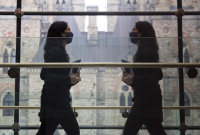Support strong Canadian climate journalism for 2025
TORONTO — With some morgues running out of space and hospitals facing an explosion in critically ill patients, Canada's COVID-19 caseload rose sharply on Wednesday, while Quebec mulled tighter restrictions that could include the country's first curfew.
Canada has now seen close to 625,000 cases of COVID-19, about 16,300 of them fatal. The bulk of cases has been in the country's two largest provinces, where conditions have been deteriorating rapidly in recent weeks.
Compounding the picture was the still small but growing number of cases related to a novel coronavirus variant first found in the U.K. that is believed to be even more contagious than the original.
In her daily update, Dr. Theresa Tam, the country's chief public health officer, said Wednesday that the appearance of new variants is more reason to scrap all but absolutely necessary travel.
Nevertheless, Transport Minister Marc Garneau lifted the ban on inbound flights from the U.K.
In the interim, the grim pandemic toll continued unbridled. Ontario reported another 37 deaths amid 3,266 new cases of the novel coronavirus as hospitals, particularly in southern Ontario, warned the intensive care situation had become dire.
Quebec reported another 47 deaths from COVID-19, with 2,641 new cases and a rise in both hospitalizations and people in intensive care.
Quebec Premier Francois Legault was expected to announce a severe lockdown across the province later Wednesday. According to multiple reports, the province might shut down "non-essential" manufacturers and the construction sector and keep schools closed.
Legault was also reportedly planning to impose a curfew as the province has recorded 217,999 COVID-19 infections and 8,488 related deaths since the beginning of the pandemic.
Ontario has recorded more than 200,000 confirmed cases and 4,767 deaths. Of the roughly 1,463 COVID-19 patients currently in hospital, more than 360 were in intensive care.
A hospital in London, Ont., was starting to store bodies in a mobile unit after its morgue reached capacity. A hospital in nearby Windsor, Ont., said it had been storing bodies in a trailer unit for the last two weeks.
David Musyj, CEO of Windsor Regional Hospital, said funeral homes were being strained by a "substantial" number of deaths in the area due in large part to COVID-19.
In a bleak assessment of the coming month, the head of the Ontario Hospitals Association warned the acute-care system is already more stretched than ever and the situation more dire.
"Unfortunately, all the indicators still are heading in the wrong direction," said Anthony Dale. "In some cases, they're accelerating, so the situation is actually getting much worse."
The Chatham-Kent Health Alliance, for example, said its intensive care unit was already at 100 per cent capacity.
To cope with the onslaught, some Ontario hospitals have begun using field units or cancelling non-urgent surgeries.
The problem for hospitals is that it will likely take another week or two to gauge the impact of current anti-pandemic measures and, more significantly, the impact of people's choices over the holidays.
New Brunswick's chief medical officer of health, Dr. Jennifer Russell, said she expected a jump in cases as a result of New Year’s Eve gatherings. Her comments came as the province reported 31 new cases — its highest single-day increase since the start of the pandemic.
In Manitoba, Premier Brian Pallister said current restrictions on businesses and public gatherings would be extended beyond this week as the province reported 167 new cases and 10 more deaths.
In Ottawa, Garneau also clarified testing requirements for passengers arriving in Canada, saying the rules that require passengers to show proof of negative COVID-19 test results will help curb the spread of the virus across borders.
Passengers must take the PCR test — distinct from a rapid test — less than 72 hours before takeoff, or 96 hours in the cases of two dozen countries, mainly in the Caribbean.
This report by The Canadian Press was first published Jan. 6, 2021





Comments